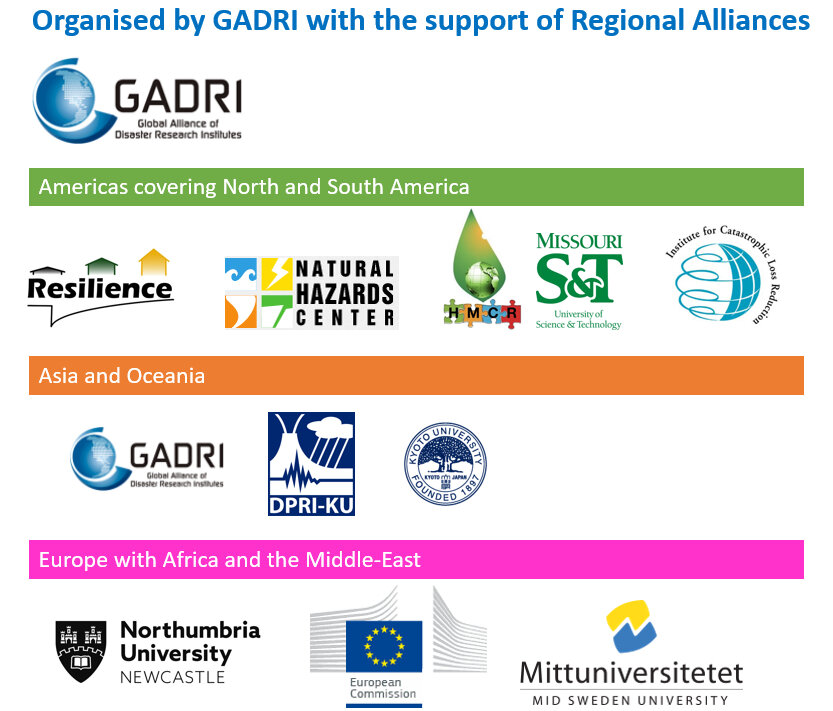Each group will pick-up a theme and the results will be reported by the rapporteur at the final panel sessions.
i. Target E – Governance - Substantially increase the number of countries with national and local disaster risk reduction strategies by 2020;
- Scientific knowledge to provide evidence for effective implementation of DRR policies
- Stock taking of current progress and status of science in the world
ii. Target F – Finance - Substantially enhance international cooperation to developing countries through adequate and sustainable support to complement their national actions for implementation of the present Framework by 2030;
- Meeting demands from policy makers and planners, and actions by science/scientists
- Emphasis on focus of science in the world today and learning by action
- Future directions for scientists to proceed towards action or practice of science
- Making action an academic concern by sharing available knowledge and targets for implementation by policy makers
iii. Post-Covid-19 Era - Health Disaster Risk Reduction and Management – Responses and measures to Covid-19 – reports or national synthesis reports on Covid-19 – lessons learned and research gaps; and global pandemics – what is next?
iv. Action Orientated Agenda Regards Integrated Disaster Risk Reduction and Climate Change Adaptation for the Next Decade - Surveying GADRI’s entire membership worldwide regards risk reduction, adaptation and resilience initiatives for a written statement draft at the GADRI summit, and feed into the process of COP26 using some of the UK hosting mechanism.
v. Accessibility of information, data, reaction to disasters, and knowledge in the absence of a system to react and respond to the situation
vi. Evaluating obstacles for scientist engagement with policy makers and practitioners, and legal challenges - Scientists and Actors Engagement Projects
- This session introduces on-going projects with the substantial engagement between scientists and actors. Scientists are expected to contribute to improve decision of actors. Presentations will provide lessons and hints how scientist and actors can effectively communicate.
vii. Exploring solutions to bridge the gaps for implementation of science in action - Route from scientific prediction to social implementation: how can we bridge the last but not least gap between academia and society for accomplishing disaster risk reduction –
- In predictions of flood or landslides in some specific cases, outputs from scientific research can provide info of spatio-temporal changes in hazard with a level of quality that is ready for application. However, actual implementation of these scientific outcome is still tough in some aspects such as law, economic repercussion, and acceptability by local residents. Discussion is needed for such final gaps remaining on the route from academia to society for accomplishing disaster risk reduction.
GADRI is a network coordinating research institutes engaged in disaster risk reduction and resilience at a global level to advance the global agenda of science community. Actions to be taken by scientists are clearly defined by the Science and Technology Roadmap and Sendai Framework Agenda for 2030. All members of GADRI will be requested to voluntarily declare and report their research achievements and contributions along the lines of the S&T Roadmap and the progress and actions in terms of supporting the implementation of the priority areas of the Sendai Framework Agenda.
GADRI membership is reaching 200 institutes excluding the members of the regional alliances. If each member institute contribute their actions towards the Roadmap, this would generate valuable information on the areas where most of the research is done and identify areas where there are gaps or where no research is being conducted.
It is proposed to prepare a questionnaire that would give the basis for group discussions with research data, gaps, where things are moving well or not, and guide to future directions.
Collected and analysed data and outputs from discussion sessions will also serve as GADRI Conference outcome and GADRI contribution to the Science and Technology Roadmap and the Sendai Framework Agenda for 2030.
Questionnaire -
- The inputs are voluntary contributions as a member of GADRI
- Questions are phrased to maintain both coherences, and easy to reply
- Target F on finance – linked to where there are research needs for funding and how to know about it. How to link the gap of funding and most needed research?
- Research collaboration activities – national and local engagements – research collaborations to bridge funding gaps
- What is the important link with academics to the society or the service offered by academics during natural hazard or emergency situations?
- Various guidelines and tools already are in place to answer these questions. How are these tools?
Registration will close on Saturday, 28th August 2021 at 12:00 hours (noon) Japan Standard Time (JST)
A final extension of the deadline for registrations -
31 Aug. 2021 - 01 Sep. 2021
5th Global Summit of Research Institutes for Disaster Risk Reduction





